On June 14 this year a group of actors, stage-workers, writers and artists took over one of Europe’s most famous theatres: the Teatro Valle in Rome.
The Teatro Valle occupation predates the ‘Occupy Wall Street’ movement and is not directly linked to it (but it has since made common cause with Occupations around the world). It has not received much notice outside Italy but I think its reverberations will one day be felt far beyond Europe. This movement is directly concerned with matters of culture: it embraces philosophical speculation and draws no lines between action and reflection.
Although the Teatro Valle occupation is not particularly noisy or showy, I think what is happening there is potentially of great significance. It may represent the first, necessarily hesitant, stirrings of a new way of thinking about the place of the arts in the world.
I visited the Teatro Valle on November 10 and spoke with several members of the group. Sylvia de Fanti, who speaks fluent English, told me that the occupation was originally intended to last just three days. 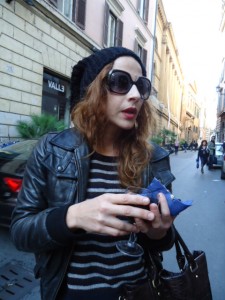 But the initiative attracted so much attention that they decided to stay on. Now they plan to stay indefinitely.
But the initiative attracted so much attention that they decided to stay on. Now they plan to stay indefinitely.
The history of the occupation goes back to 2008, said Sylvia. It was founded in response to drastic cuts in the government’s already-diminished expenditure on culture and the arts. In the beginning the group called itself the ‘0.3 movement’, after the percentage of government expenditure that was allotted to the arts. They began to think about occupations as a means of protest soon after they came together. Then in 2010 the state-funded National Agency of Theatre was suddenly disbanded, and that too in the middle of theatre season.
‘It was clear now the strategy of the Berlusconi government,’ said Syliva. ‘To cut everything that is not for profit. Everything that is not meant for profit would be put up for sale – archives, libraries. They are running public systems into the ground so that they can privatize them. And who knows where the money would come from? In Italy black money is everywhere.’ [for more on this see also my post of Nov 9].
The government responded with derision to the first stirrings of protest. ‘You don’t eat with culture,’ said Giulio Tremonti, the Minister of Finance; his colleague, Renato Brunetta, the Minister of Culture referred to young Italians as bamboccioni – ‘the spoilt-child generation’.
Such was the background to the occupation that began on July 14, 2011. It was intended to forestall the sale of Italy’s cultural heritage by Prime Minister Berlusconi and his henchmen.
Laura Verga is
an actress and has been involved in the movement from the start (it just so happened that she was reading Sea of Poppies in Italian!). She told me that the Teatro Valle was founded in 1727 and has long been the most important public theatre in Rome. This was where Rossini’s opera, La Cenerentola, was first performed; Pergolesi and Donizetti chose to present new works here. Pirandello’s path-breaking Six Characters in Search of an Author premiered in this theatre and caused a great commotion. The spectacle of actors speaking from the well of the theatre outraged many in the audience: the dissolution of the traditional spatial barrier between cast and audience was regarded as a scandal.
‘Pirandello broke the fourth wall of the theatre’, said Sylvia,
‘and that is exactly what we are trying to do. We are trying to create a continual dialogue – ‘occupy what is ours’ is how we speak of it. When we moved into the theatre the response from the public was so strong that we could not leave as we had planned. That was when the idea of transforming the theatre into a ‘cultural commons’ came up. After all a ‘commons’ is not a gift of nature. Water for example. In order to keep it in the commons you have to fight for it. In India you know this very well, don’t you? People there have had to fight to keep their water from being privatized.’
The occupation plans to turn the Teatro Valle into a foundation, so that performers and performances can be free of governmental interference. They hope that a law will eventually be passed to that effect.
‘But we don’t want to return to the old ‘public/private’ dichotomy,’ said Sylvia. ‘We want to invent a new ecosystem of culture, a new way of thinking about the economy. You cannot put a monetary value on culture. We don’t want rules but we do want to keep some guiding principles. We don’t want a star system in the theatre – we would like the pay of the highest and lowest actors to be proportional, not disproportional. For productions too there must be some even-ness, without money being lavished on one and taken from the other. The Italian constitution says culture must be funded by the government – we want to establish a model of a new system. We are not just against certain things – we also want to propose new things. In that sense we are proposing a revolutionary system.’With a smile she added: ‘The last line of the play I am producing today is: ‘The revolution will not be televised; the revolution will be live!’
Many new communities are emerging around the movement, Sylvia told me. ‘During the Venice Film Festival this year, we occupied a theatre in the Lido [the island where the festival is held] – the Teatro Marinoni which is on the grounds of an old hospital, the Ospedale al Mare. The theatre had been abandoned and was filled with rubbish. The whole area was going to be sold off to property speculators. We cleaned it and wrote a dossier on what was going on. We staged plays and other events there annd many of those who had come to the film festival came to be with us – David Byrne, Darren Oronofsky and others. It was probably more fun for them to be with us than to go to some boring official event. [I was aware of a twinge of envy – in 2001, when I served on the Venice jury, there were no ‘Occupations’ and no escape from official tamashas].
Laura interjected: ‘Calvino says in his Invisible Cities that the three places you have to go to first, when you visit a new city, are the church, the market and the theatre. These are the most important public places. At the beginning of the 18th century the theatre was open from 2 in the afternoon till 2 at night. The theatre must be open always.’
In keeping with this credo the occupation organizes events through the day – seminars, lectures, readings and performances. It has quickly established itself as one of Rome’s most important cultural venues. The evening events are so popular that the queues frequently extend far beyond the theatre, winding through the surrounding streets and lanes. Many university teachers give freely of their time, holding seminars and classes. Some deal with ecological and economic issues, but there is also a great emphasis on stories and story-telling. One of the best-attended seminars is called ‘Narratives of the Present’.
Andea Barranes, was one of the many who turned up at the theatre that afternoon.
He is an economist who works with the ‘Campaign to Reform the World Bank’. [I had a long and interesting conversation with him, on Italy’s financial crisis, but that will have to wait for a later post – in the meanwhile here is one of the websites with which he is associated].
Also present was Sylvia Gallerano,
an actress who has played the lead in an Italian adaptation of Mahasweta Devi’s Draupadi. She told me that Mahasweta-di had attended one of her performances and had liked it so much that she had given her a big hug afterwards. ‘I will never forget that hug,’ she said [in this, of course, she differs not a whit from anyone who has ever been hugged by Mahasweta-di].
Later Laura took me on a tour of the lovely old theatre.
On stage a seminar was in progress.
It was led by a philosopher, Frederica Giardini, and the subject under discussion was the de-colonization of language.
This surprised me. ‘But Italy was never a colony, was it?’ I said. ‘At least not in the same way as India or Morocco?’
Laura explained that they were talking about freeing language from the influence of marketing and corporate power. ‘Because of television and advertising people have become accustomed to words that have no meaning. We want to restore the richness of our language.’
Then Laura led me backstage, into a Piranesian interior, filled with beams, ladders and ropes.
In the theatre’s early days the stagehands were mainly sailors, Laura told me. Only sailors could handle the ropes and wheels; only they could cope with the heights.
Climbing narrow staircases
we went up to the perches from which the stage equipment is operated.
Then Laura opened a door and suddenly we were outside, surrounded by Rome’s ancient rooftops.
The occupiers often climb up to that terrace at night, Laura told me. It is a wonderful place in which to dream and talk.
In Rome one is reminded at every step of the many ways in which the past nourishes, nurtures and rejuvenates the present. This is why the value of the past cannot be measured in cash: because it is value itself, in the sense that it generates the values through which people evaluate the meaning of their own lives.
To turn to those who have preceded us on this earth is perhaps our first instinct in times of confusion and crisis. And it sometimes happens that our ancestors do speak back – and if we listen carefully we can even hear their whispers, amidst the silent bones of the things they have left for us.
That is the significance of ‘Occupy Teatro Valle’: it is trying to restore an appreciation of value to a world that seems to have forgotten what it is.
[The occupation’s websites are here: blog and Facebook: Teatro Valle Occupato.]

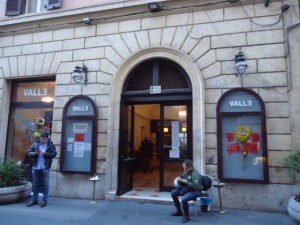
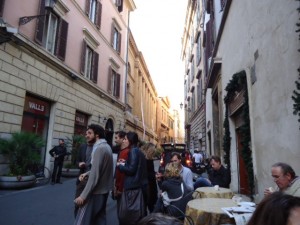
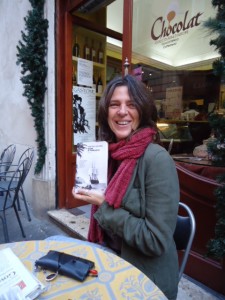
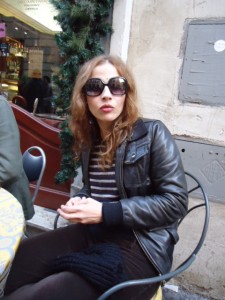
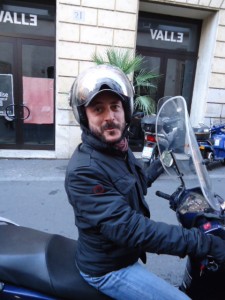
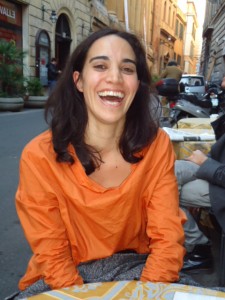
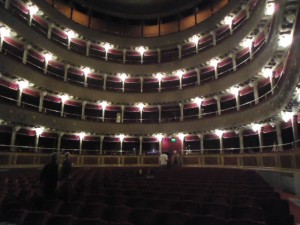
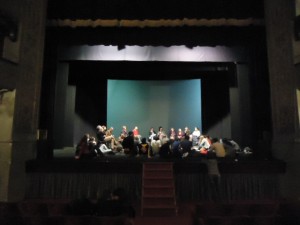
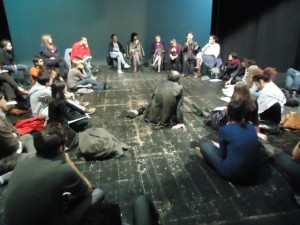
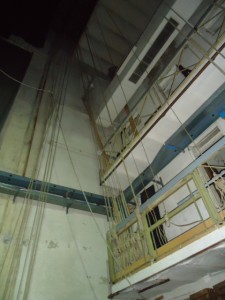
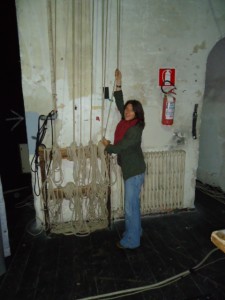
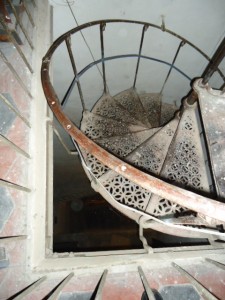
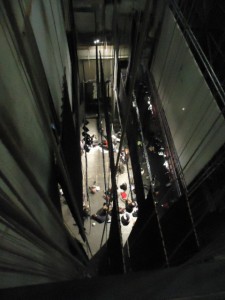
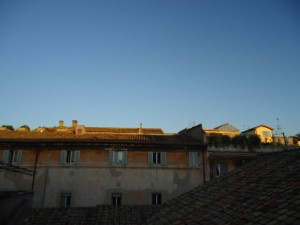
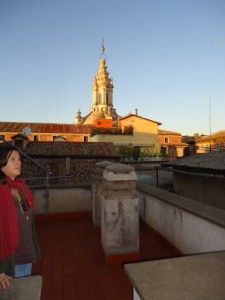
The lyrical quality of your writings has never failed to overwhelm me. But surrealistic sentences like “if we listen carefully we can even hear their whispers, amidst the silent bones of the things….” can be pretty distractive! Hence let us talk business.
The Teatro Valle occupation may predate the ‘Occupy Wall Street’ movement but you are right, they are of the same genre. The crash commercialization of everything around us is the common cause. The vulgar power of money and the preachers and teachers of “money only “cult has dominated all walks of our lives. Amassing money and associated power has become the only benchmark for success. It is no surprise that the Italian Finance Minister can make such derisive comment on culture with impunity or for that matter traders, bootleggers and power brokers in India can hold the entire society at ransom. Even Americans have now seen the real face of “capitalism”; the entire society is on the brink of a class war albeit without guns, till now. Entrepreneurs are now substituted by manipulators. American dream has gone sour. The entire Arab world is in the doldrums.
But who failed us? Are we the baby boomers ourselves? In the pursuit of ‘success ‘did we create a wrong prototype for future? Look at India, the self styled super power. As if a growing GDP is the only cure for social upliftment and inequality. More than the half of the population is below “poverty line” while the same country is regularly producing billionaires with much fanfare. What a shame! The capital Delhi itself is the epitome of this all pervasive malady. In the word of a female travel writer from Europe, “India’s most beautiful city filled with worst rogues of the world”. I would like to echo the words of Sylvia that we need not “return to the old ‘public/private’ dichotomy”, but on a different vein. Now the “public” enterprises, even services, in India have become more corrupt, more insensitive than their “private” counterparts. Bureaucrats and public sector honchos are the modern “Jotdars”. So now there is no dichotomy. The common thread of corruption, greed and arrogance achieved a rare unity.
Again what is to be blamed? Erosion in value system and serious decadence in social structure? Lack of proper education? Are we only producing literates but not educated mass? Where commerce education gets precedence over history or fine arts simply because it is more paying in the job market? I’m no exception. A budding historian turned into a chartered accountant! The trading community really owns the country but what is their contribution for the society at large? “Occupiers” of Wall Street are damn right; politicians are only the servants of the business community. But the cancer is spreading fast. Even the middle class, the eternal vanguard for “values” are also affected. Everybody wants quick bucks. By hook or by crook, there is no moral authority left. One or two “Anna Hazare”may cause a temporary stir but can it cause an “Indian Spring” of similar magnitude and depth that pervades the entire Arab world?